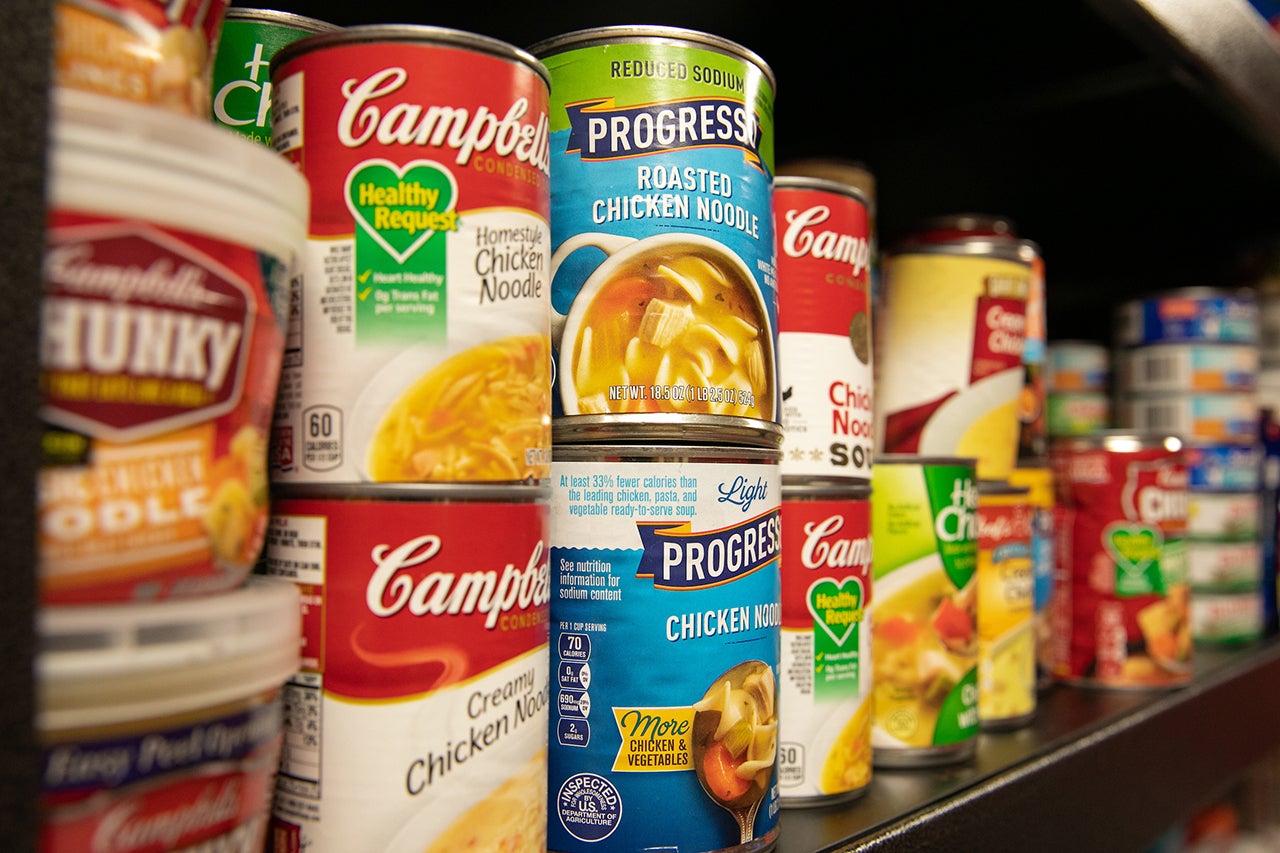It’s easy to ignore a problem if you don’t see it. So when senior Megan Stover learned there were students at CofC who didn’t always have enough food to eat, she was shocked and saddened. More importantly – she was moved to take action.
Stover and other members of the campus community celebrated the opening of the Cougar Pantry on Wednesday, Sept. 5, 2018, on the second floor of the Stern Student Center. The result of a student-driven initiative to help students facing food insecurity, the Cougar Pantry is a food pantry providing dry-goods and hygiene products at no charge to any College of Charleston student in need. The effort is supported by the Office of Student Life.

Cougar Pantry ribbon cutting with Tripp Keefe, Megan Stover and Alicia Caudill. (photos by Heather Moran)
“If we don’t live with an issue, we have a veil over our eyes and we don’t understand that people on this campus and people in the community are dealing with a broader issue [of food insecurity],” Stover, who is the president of the pantry, told a group of faculty, staff and students who gathered at the Stern Center for the ribbon-cutting. “It’s just really important that we not only use this pantry to get help to students who need the help, but to also expand the knowledge of the issue [of food insecurity] that’s happening now.”
Alicia Caudill, executive vice president for Student Affairs, said efforts to address food insecurity at the College started three years ago when a group of students began looking into students’ needs on campus. Out of that effort came an idea for a food pantry. Meanwhile, a communication class project in her sophomore year challenged Stover and her classmates to come up with a plan that would make a positive impact on campus. Stover and her project partners chose to look at how a food distribution program could make a difference. The group stuck with the idea beyond the class, working with the Office of Student Life to form a student organization that would eventually become the Cougar Pantry.
Caudill said a 2017 study by the Riley Center for Livable Communities to examine housing and food insecurity among CofC students reinforced the need for efforts, like the food pantry. Data from the study showed that 30 percent of CofC students reported being either housing or food insecure. That data led College administrators to launch a Food and Housing Insecurity Task Force to identify more ways to help students in need.
“Today I believe we’re one step closer to being a little bit more inclusive of all of our students’ needs,” Caudill said during the pantry ribbon cutting.
Student Government Association (SGA) President Tripp Keefe praised Stover and the other student members of the Cougar Pantry for seeing their idea to fruition. SGA donated money to pay for shelving for the new pantry.
“Megan Stover and those in her organization are student leaders in every sense, those that came before her and got the ground work laid for this are student leaders in every sense,” said Keefe. “They worked tirelessly, for literally years, to make this food pantry a reality – and they’ve done it.”
The pantry is located near the elevator on the second floor of the Stern Center. Student-volunteers will manage the day-to-day operations of the pantry, which will be open Sundays from 1 p.m. to 3 p.m.; Mondays from 10 a.m. to 12 p.m.; and Mondays, Wednesdays and Fridays from 3 p.m. to 6 p.m. To access the pantry, students must present their Cougar Card. No other information is required. There are no restrictions on the number of times a student may visit the pantry each week. Students may choose up to 10 items per visit.
Christine Workman, director of the Office of Student Life, said that to date the pantry has been stocked through campus food drives. Faculty, staff or community members who want to donate to the pantry may drop off dry goods at the Stern Center information desk during normal business hours. Based on usage, Workman said the College may look to partner with external organizations to help stock the pantry in the future.
“We’re trying to see what we need and how we need it,” said Workman.
For Stover, who is a double-major in Spanish and public health, the exercise of seeing the pantry from inception to reality has been a lesson in the value of collaboration and compassion.
“Seeing the need and learning about it made it real to me,” she said. “I come from a home where I have both parents who are able to help me when I need it. Not everyone has that. So taking that veil off my eyes and learning about that was powerful.”






